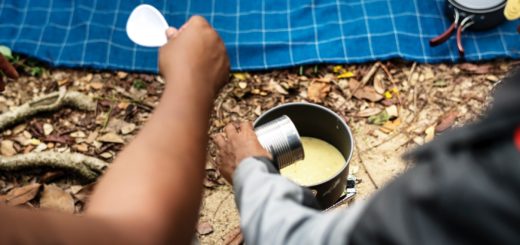Backpacking Alone for the First Time – A Guide
by Bernard S ·
This page may contain affiliate links. For more information, see our "About Us" page.
A Guide to Backpacking Alone for the First Time

Embarking on a solo backpacking adventure is an exhilarating experience that allows you to explore the world on your own terms. Whether you’re a seasoned traveler or a first-timer, venturing out into the great unknown solo can be both exciting and intimidating. In this comprehensive guide, we will delve into the essential tips, safety precautions, and empowering insights to help you make the most of your first time backpacking alone.
Solo Backpacking - Embracing the Freedom
Embarking on a solo backpacking adventure is a truly liberating experience that allows you to break free from the constraints of daily life and immerse yourself in the wonders of the world. It opens up a world of possibilities where you can set your own pace, make spontaneous decisions, and truly embrace the freedom that comes with traveling solo.
One of the greatest advantages of solo backpacking is the complete autonomy it offers. You have the power to choose your own path, to wander off the beaten track, and to follow your own instincts. There is no need to compromise or accommodate the preferences of others. You can immerse yourself in the experience fully, uninterrupted by distractions or conflicting schedules. It’s a time to reconnect with your inner self, to reflect on your thoughts, and to discover new facets of your personality.
Solo backpacking allows you to truly live in the present moment. With no distractions from travel companions, you can fully absorb the beauty of your surroundings, savor the sights, sounds, and smells of nature, and engage with the local culture on a deeper level. You have the freedom to change your plans at a moment’s notice, to extend your stay in a place that captivates you, or to move on when you feel ready.
Embrace this newfound freedom as you embark on your solo backpacking adventure. Embrace the exhilaration of charting your own course, the thrill of discovering hidden gems, and the joy of forging your own path through the world. It’s a journey that will empower you, inspire you, and leave you with memories that will last a lifetime.
Researching and Planning
Thorough research and meticulous planning are essential when embarking on a solo backpacking adventure. Taking the time to gather information and plan your journey will ensure a smoother and more enjoyable experience. Here’s a closer look at the key aspects to consider during the research and planning phase.
- Begin by selecting a destination that aligns with your interests, comfort level, and desired level of adventure. Consider factors like climate, terrain, difficulty level, and the availability of amenities and support systems. Look for destinations that offer safe and beginner-friendly routes, scenic trails, and a supportive backpacking community.
- Delve into guidebooks, online resources, and travel forums to gather as much information as possible about your chosen destination. Learn about the local customs, culture, and any specific regulations or permits required for backpacking in the area. Take note of the best times to visit, as weather conditions can greatly impact your experience.
- Create a detailed itinerary that outlines your route, accommodation options, and points of interest. While it’s important to have a plan, leave room for flexibility and spontaneity. Keep in mind that unexpected delays or changes may occur, and being adaptable will enhance your overall experience.
- Research transportation options, both for reaching your destination and for getting around once you’re there. Look into public transportation, shuttle services, or rental car availability, depending on the location. Additionally, familiarize yourself with emergency contact numbers, nearby medical facilities, and the availability of communication networks in the area.
- Engage with fellow backpackers through online communities, travel forums, and social media platforms. Seek advice, ask questions, and learn from the experiences of others who have visited your chosen destination. Their insights can provide valuable tips, recommendations, and even potential travel companions if desired.
By thoroughly researching and planning your solo backpacking trip, you’ll be equipped with the knowledge and confidence to navigate your chosen destination. Remember, the more you prepare, the more you can focus on enjoying the journey and immersing yourself in the incredible experiences that await you.

Packing Smart When Backpacking Alone for the First Time
When embarking on a solo backpacking adventure, packing smart is crucial to ensure that you have all the essentials while keeping your load manageable. Here are some considerations to keep in mind when it comes to packing for your solo journey.
- Invest in a high-quality, lightweight backpack: Your backpack is your lifeline during your solo adventure. Opt for a backpack that is durable, comfortable to wear, and specifically designed for backpacking. Look for features like adjustable straps, a supportive hip belt, and multiple compartments for organized packing.
- Pack the essentials: Prioritize the essentials while keeping your backpack weight to a minimum. These essentials include a compact tent, a warm and lightweight sleeping bag, a sleeping pad for added comfort, and appropriate clothing for various weather conditions. Opt for quick-drying and moisture-wicking materials that are lightweight and versatile.
- Choose the right footwear: Selecting the right pair of hiking boots or shoes is essential for your comfort and safety. Invest in footwear that offers good ankle support, has a sturdy grip, and is suitable for the terrain you’ll be traversing. Break in your footwear before your trip to avoid discomfort and blisters.
- Bring necessary gear: In addition to the basics, consider packing essential gear such as a reliable navigation device (e.g., a GPS or compass), a headlamp or flashlight, a multi-tool, a first aid kit, and a water purification system. These items will help you navigate, stay safe, and handle unexpected situations that may arise during your journey.
- Pack ample food and water supplies: Depending on your destination and the availability of resources, ensure you have enough food and water to sustain yourself during your backpacking trip. Pack lightweight, non-perishable foods that provide sufficient energy and nutrition. Consider using water reservoirs or collapsible bottles to carry an adequate water supply.
- Leave non-essentials behind: It’s important to resist the temptation to pack unnecessary items that will only add weight to your backpack. Evaluate each item’s usefulness and prioritize functionality over luxury. Minimize the number of electronic devices and opt for lightweight alternatives whenever possible.
Remember, the key to packing smart when backpacking alone for the first time is striking a balance between having the essentials and keeping your load light. Every item you carry should serve a purpose and contribute to your comfort, safety, and enjoyment of the journey.
Safety First During Solo Backpacking Trips -- Always
Ensuring your safety is paramount when embarking on a solo backpacking adventure. By taking necessary precautions and staying vigilant, you can minimize risks and enjoy a safe and worry-free journey. Here are some essential safety tips for solo backpackers:
- Inform someone you trust: Before setting off on your solo adventure, inform a reliable person about your itinerary. Share details such as your planned route, estimated duration, and any specific checkpoints or destinations you intend to visit. Regularly update them on your progress and notify them when you reach your intended destinations.
- Carry a fully charged phone: Keep a fully charged mobile phone with you at all times. Ensure you have a reliable signal or a backup communication device if you’re traveling to remote areas. Familiarize yourself with emergency contact numbers for the local authorities, as well as any specific helplines available for hikers or backpackers.
- Utilize personal safety devices: Consider carrying personal safety devices to enhance your security. A whistle can be an effective tool to attract attention in case of emergencies. Additionally, a personal safety alarm can help deter potential threats and alert others to your situation.
- Be aware of your surroundings: Stay vigilant and be mindful of your surroundings at all times. Trust your instincts and avoid isolated or unfamiliar areas, especially during nighttime. If you encounter any suspicious or uncomfortable situations, it’s best to remove yourself from them and seek assistance if necessary.
- Practice proper trail etiquette: Respect the natural environment and adhere to trail etiquette guidelines. Stay on designated paths to minimize the impact on flora and fauna. Properly dispose of waste and leave no trace of your presence. By being a responsible backpacker, you contribute to preserving the natural beauty of the destination for future adventurers.
- Stay updated on weather conditions: Keep yourself informed about weather conditions before and during your backpacking trip. Sudden changes in weather can pose risks, such as flash floods or severe storms. Plan your route accordingly and be prepared to adjust your itinerary if needed to ensure your safety.
Remember, safety should always be your top priority when backpacking alone for the first time. By following these safety tips, staying aware of your surroundings, and being prepared for unforeseen circumstances, you can enjoy a safe and unforgettable solo backpacking experience.

Connecting with Fellow Solo Backpackers
One of the most enriching aspects of solo backpacking is the opportunity to connect with locals and fellow travelers along your journey. Building these connections can enhance your travel experience, provide valuable insights, and create lasting memories. Here are some ways to foster meaningful connections during your solo backpacking adventure:
- Engage in cultural experiences: Immerse yourself in the local culture by participating in cultural activities or events. Attend traditional festivals, visit local markets, or join cooking classes to learn about the region’s culinary traditions. By engaging in these experiences, you not only gain a deeper understanding of the local culture but also create opportunities to interact with locals and fellow travelers who share similar interests.
- Stay in local accommodations: Opt for accommodations that offer opportunities for interaction with locals. Consider staying in guesthouses, homestays, or small family-run hotels. These types of accommodations often provide a more personalized experience, allowing you to connect with the hosts and other guests, who can offer valuable insights and recommendations.
- Join group activities or tours: Participate in group activities or tours that cater to backpackers or outdoor enthusiasts. These activities, such as guided hikes, city tours, or adventure excursions, provide opportunities to meet like-minded individuals who share a passion for exploration. Engage in conversations, exchange travel stories, and make new friends along the way.
- Utilize online communities: Take advantage of online communities and travel forums to connect with fellow backpackers before and during your trip. Join relevant social media groups or forums where you can ask questions, seek advice, and even find potential travel companions. These platforms are a great way to connect with individuals who share similar travel interests and may be exploring the same destination.
- Volunteer or participate in local projects: Consider participating in volunteer programs or community projects during your solo backpacking journey. This allows you to contribute to local initiatives while connecting with locals who are passionate about making a positive difference. Check for opportunities in fields such as conservation, education, or community development.
- Be open and approachable: Approach each interaction with an open mind and a friendly attitude. Smile, greet locals, and be respectful of their customs and traditions. Be open to conversations with fellow travelers and actively seek opportunities to connect. Sometimes, a simple conversation can lead to unexpected friendships and unforgettable experiences.
By actively seeking opportunities to connect with locals and fellow travelers, you enrich your experience of backpacking alone for the first time with diverse perspectives, cultural exchange, and meaningful connections. Embrace these connections, as they have the potential to enhance your journey and create lifelong friendships.
Embracing the Solitude
Embarking on a solo backpacking adventure can be a transformative and empowering experience. It offers a unique opportunity for self-discovery, personal growth, and the freedom to shape your journey according to your own desires and interests. Here are some reasons why embracing solo adventures is worth considering:
- Self-discovery and personal growth: Solo backpacking allows you to step out of your comfort zone and discover your true capabilities. It challenges you to rely on your instincts, make decisions independently, and overcome obstacles along the way. Through these experiences, you develop resilience, self-confidence, and a deeper understanding of yourself.
- Flexibility and freedom: When traveling alone, you have the freedom to customize your itinerary according to your interests and preferences. You can spontaneously change your plans, explore off-the-beaten-path destinations, or extend your stay in a place that captivates you. This flexibility enables you to fully immerse yourself in the journey and follow your own rhythm.
- Enhanced mindfulness and self-reflection: Solo backpacking provides a unique opportunity for solitude and self-reflection. Disconnecting from the distractions of daily life allows you to be fully present in the moment and appreciate the beauty of your surroundings. It offers a chance to reconnect with nature, gain clarity, and foster a deeper sense of mindfulness.
- Meeting new people and forming connections: When traveling alone, you are more likely to engage with locals and fellow travelers. This opens doors to meaningful connections, cultural exchange, and the chance to broaden your perspective. Whether it’s sharing stories around a campfire or striking up conversations with locals in a bustling market, solo adventures often lead to unforgettable encounters.
- Empowerment and independence: Solo backpacking empowers you to rely on yourself and make decisions based on your own judgment. It boosts your self-reliance, problem-solving skills, and adaptability. As you navigate through unfamiliar environments and overcome challenges, you gain a sense of independence that transcends into other aspects of your life.
- Unforgettable memories and unique experiences: Solo adventures often result in some of the most memorable moments of a lifetime. Whether it’s witnessing a breathtaking sunrise from a mountaintop, discovering hidden gems in a bustling city, or sharing laughter with newfound friends, these experiences become cherished stories that shape your personal narrative.
Embracing solo adventures opens the door to a world of self-discovery, personal growth, and unforgettable experiences. It allows you to break free from the ordinary and embark on a journey that is uniquely tailored to your desires and aspirations. So, pack your backpack, trust your instincts, and let the magic of solo backpacking unfold.
Backpacking Alone for the First Time - Conclusion
Embarking on a solo backpacking adventure for the first time is an empowering experience that can forever change your perspective on travel and self-reliance. By following these tips, prioritizing your safety, and embracing the freedom of solo exploration, you’ll embark on a memorable journey filled with personal growth, breathtaking landscapes, and incredible encounters. So, pack your backpack, lace up your boots, and venture into the world with confidence! With the tips laid out here, you should feel more confident when you decide to tackle backpacking alone for the first time!
For more backpacking related content, consider checking out our article How to Avoid Blisters When Hiking or Backpacking! Happy travels!



